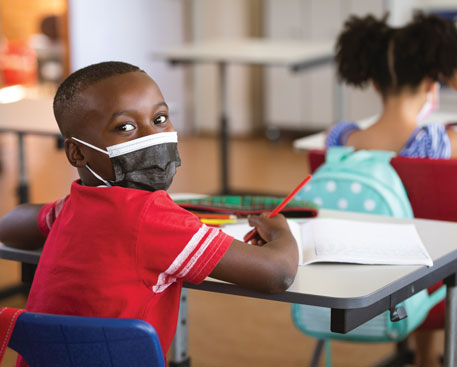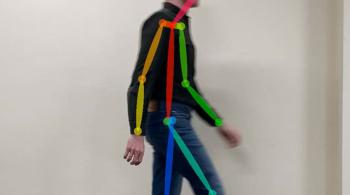
At the start of the pandemic, as communities implemented restrictions to limit the spread of the COVID-19 virus, schools across the country shifted from in-person to virtual learning. It was a stressful change for many students, particularly those with intellectual and developmental disabilities, many of whom require hands-on instruction, speech and occupational therapies, and other specialized services throughout the school day.
For them, a full return to the physical classroom—five days a week—was crucial. But as the pandemic continued, additional steps were needed to ensure their health and safety. Since July 1, the four schools that comprise Kennedy Krieger School Programs, which serve about 500 students with intellectual and developmental disabilities a year, have been taking part in a study examining how well frequent asymptomatic coronavirus testing of students and school staff members works at allowing as many students with disabilities as possible to attend school in person, five days a week, during a pandemic.
“Routine testing is important, since many children with intellectual and developmental disabilities have difficulty with preventive measures, such as mask-wearing, hand hygiene and social distancing,” explains Co-Principal Investigator Dr. Luther Kalb, director of the Informatics Program at the Institute’s Center for Autism and Related Disorders. “This puts them at increased risk for contracting the coronavirus. Many of these children also have underlying medical conditions that put them at a higher risk for having poor outcomes if they develop COVID-19.”

The study, “Supporting the Health and Well-being of Children With Intellectual and Developmental Disability During COVID-19 Pandemic,” is part of a larger project funded by the National Institutes of Health and overseen by the Washington University School of Medicine in St. Louis.
Advising Kennedy Krieger on its role in the study is the community advisory board of the Maryland Center for Developmental Disabilities (MCDD), the Institute’s advocacy arm.
For the past year, participating students and school staff members have been tested for the COVID-19 virus once a week. Testing continues through May of 2022. The MCDD has also been working with some of the students’ parents and guardians to determine what facilitates—and what poses barriers to— coronavirus testing in the community.
“We are hopeful that the results of this study will be helpful to school communities and families across the country, both now—as we continue to navigate the pandemic—and in the future,” says Co-Principal Investigator Dr. Linda Myers, one of the Institute’s vice presidents of school programs.

“There’s not a lot of public health research that focuses on the disability community,” adds Co-Principal Investigator and MCDD Director Maureen van Stone. “Because of our work, we know more now about the impact of a public health crisis on the disability community than we did before. That sets us up to better serve that community during future health crises.”
While the study is funded by the federal government, that’s not always the case for public health research, and private donations can make a big difference.
Public health research seeks to improve quality of life for everyone, and the need for that work never stops.” – Maureen van Stone






